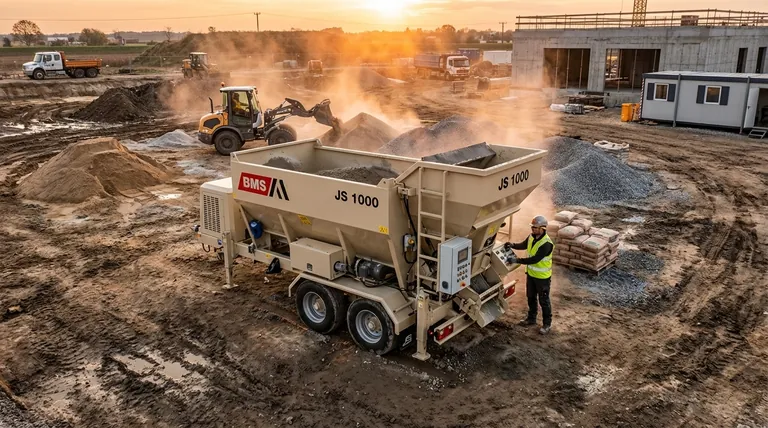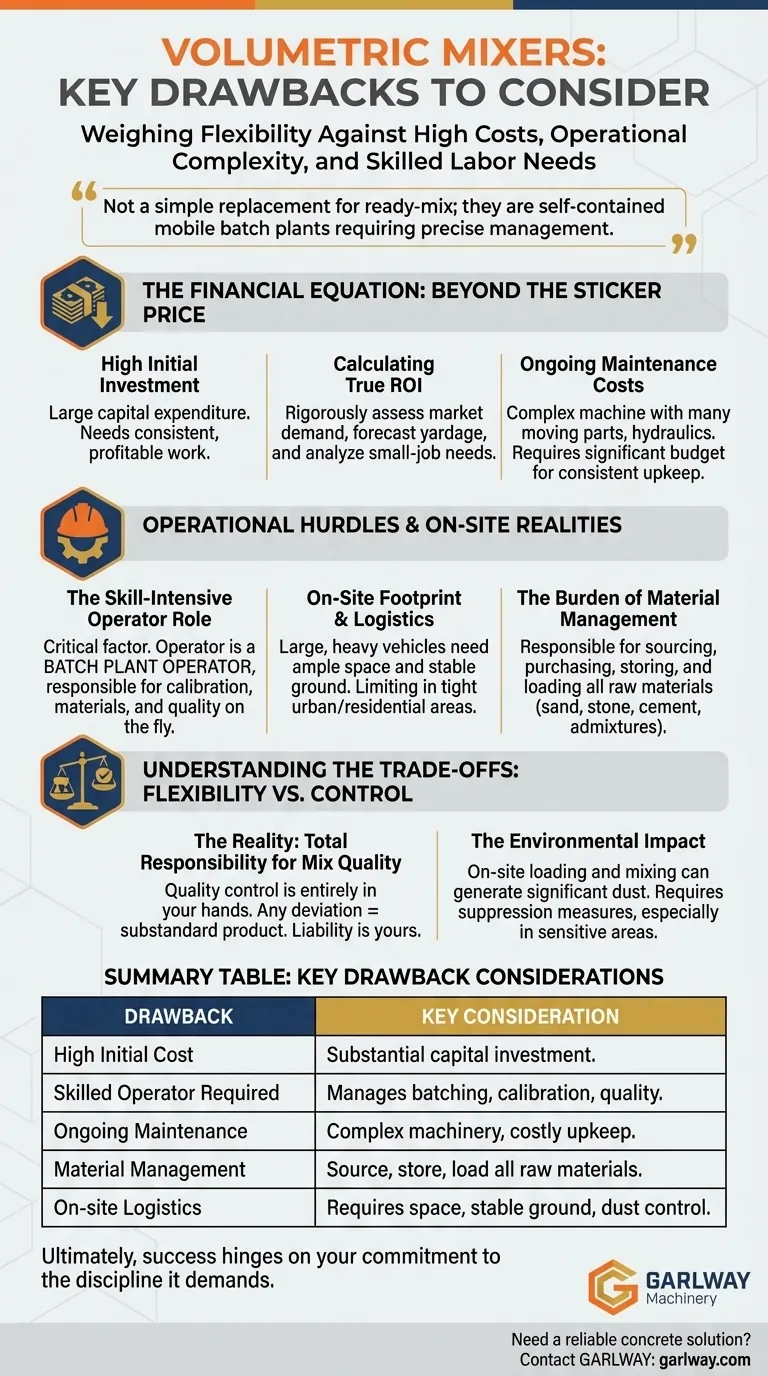Before purchasing a volumetric mixer, you must weigh its significant advantages in flexibility and waste reduction against major drawbacks, including high upfront and ongoing costs, greater operational complexity, and the critical need for highly skilled operators to ensure concrete quality.
While volumetric mixers offer unmatched on-site adaptability, they are not a simple replacement for traditional ready-mix. They are a self-contained mobile batch plant, and their profitability hinges entirely on your ability to manage the associated financial, logistical, and quality control responsibilities.

The Financial Equation: Beyond the Sticker Price
The most immediate hurdle is the cost, but a proper evaluation goes much deeper than the initial purchase. You are investing in a business unit, not just a truck.
High Initial Investment
A new volumetric mixer represents a substantial capital expenditure. This cost must be justified by a clear and consistent stream of profitable work.
Calculating True ROI
To determine if the investment is sound, you must rigorously assess your market. This includes forecasting your expected yardage per month and year and analyzing the local demand for the small-to-medium-sized jobs where these mixers excel.
Ongoing Maintenance Costs
These are complex machines with numerous moving parts, hydraulic systems, and calibration equipment. You must budget for significant and consistent maintenance to ensure the mixer operates reliably and produces quality concrete.
Operational Hurdles and On-site Realities
The daily operation of a volumetric mixer presents challenges that are fundamentally different from ordering from a ready-mix supplier.
The Skill-Intensive Operator Role
The most critical factor for success is the operator. This person is no longer just a driver; they are the batch plant operator, responsible for calibrating the mix, managing materials, and ensuring quality control on the fly. Inadequate training directly leads to poor-quality concrete.
On-Site Footprint and Logistics
Volumetric mixers are large, heavy vehicles. You must ensure every job site has adequate space for the truck to maneuver and set up on stable ground. This can be a limiting factor in tight urban or residential areas.
The Burden of Material Management
Owning a volumetric mixer means you are now responsible for sourcing, purchasing, storing, and loading all raw materials—sand, stone, cement powder, and admixtures. This adds significant logistical complexity to your operation.
Understanding the Trade-offs: Flexibility vs. Control
The core appeal of a volumetric mixer is its flexibility, but this advantage comes with a direct transfer of responsibility from the ready-mix plant to you.
The Promise: Reduced Waste and Fresh Concrete
Volumetric mixers are celebrated for eliminating waste by producing the exact amount of concrete needed. Because it's mixed on-site, the concrete is always fresh, with no risk of a "hot load" that has begun to set prematurely.
The Reality: Total Responsibility for Mix Quality
With a traditional supplier, mix quality is certified at the plant. With a volumetric mixer, quality control is entirely in your hands. Any deviation in material quality, moisture content, or machine calibration can result in a substandard product, and the liability is yours alone.
The Environmental Impact
The process of loading dry materials and mixing them on-site can generate significant dust. This is a critical consideration for work in sensitive or residential areas and may require dust suppression measures.
Making the Right Choice for Your Operation
To decide if a volumetric mixer is a wise investment, evaluate it against your primary business goals.
- If your primary focus is high-volume, standardized jobs: Collaborating with established ready-mix suppliers is often more cost-effective and provides more consistent quality assurance.
- If your primary focus is specialized, remote, or after-hours work: The on-demand nature of a volumetric mixer can provide a powerful competitive advantage that outweighs the operational costs.
- If your primary focus is cost reduction on small pours: Carefully model your break-even point against ready-mix short-load fees, ensuring you account for all maintenance, material, fuel, and skilled labor costs.
Ultimately, a volumetric mixer is an investment in operational capability, and its success hinges on your commitment to the discipline it demands.
Summary Table:
| Drawback | Key Consideration |
|---|---|
| High Initial Cost | Substantial capital investment for the mixer truck. |
| Skilled Operator Required | Operator must manage batching, calibration, and quality control. |
| Ongoing Maintenance | Complex machinery requires regular, costly upkeep. |
| Material Management | You source, store, and load all raw materials (sand, stone, cement). |
| On-site Logistics | Requires ample space, stable ground, and dust control measures. |
Need a reliable concrete solution for your construction projects? At GARLWAY, we specialize in high-performance construction machinery, including concrete batching plants and mixers designed for efficiency and durability. Whether you're a contractor or a large construction company, our equipment helps you deliver quality results with reduced operational complexity. Contact our experts today to find the perfect concrete machinery for your needs!
Visual Guide

Related Products
- JS1000 Volumetric Concrete Mortar Mixer for Sale Skid Steer Cement Mixer
- Belle Cement Mixer JS2000 Volumetric Concrete Mixer for Harbor Freight
- JZC500 Large Cement Mixer Machine Price for Concrete Mix
- Ready Mixer Machine for Construction Ready Mix Machinery
- Shaft Mixer Machine for Cement and Regular Concrete Mixing
People Also Ask
- What materials can be mixed with a versatile skid steer concrete mixer?
- How does a volumetric concrete mixer contribute to sustainability? Reduce Waste, Water, and Emissions On-Site
- What are the advantages of a volumetric concrete mixer? Achieve Total Control & Zero Waste
- What is the difference between volumetric concrete mixer and concrete mixer? Maximize On-Site Efficiency & Eliminate Waste
- What is the purpose of a volumetric concrete mixer? Gain On-Demand Mixing & Zero Waste



















